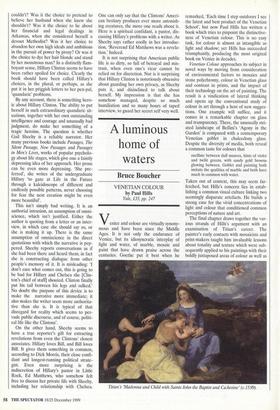Spoiled for
choice
Minette Marrin
HILLARY'S CHOICE by Gail Sheehy Simon & Schuster, £18.99, pp. 480
There must be many people who feel that they have long since heard more than enough about Hillary Clinton and her pre- posterous husband. There must be others whose slight remaining interest has been sated by recent newpaper extracts from Gail Sheehy's new biography, Hillary's Choice, which printed all the best bits. The need for the book itself, therefore, is per- haps rather doubtful, in this country at least. However, the rise and fall of the Clintons, as high tragicomedy or as a great American bestiary, is such an extraordi- nary spectacle that it is worth reading any account of it that makes such ambitious claims as this one. Years of observation, thousands of hours of taped interviews and a huge research team have, according to the author, revealed the real, the unknown Hillary Clinton.
I doubt whether that is true, but the book makes very good light, sensational reading, with plenty of sharp, plausible insights. The story of a dumpy, frumpy girl from a miserable home in suburban Chica- go rising to the dizzy heights on which she now so alarmingly teeters is quite remark- able. Even as a child, according to the hours of taped interviews, huge research team etc, Hillary had outstanding drive and self-possession, though very little tact, humour or charm. Against formidable odds, she invented herself, got herself to Wellesley, shone academically, became a famous student politician and speaker. Then she accosted Bill Clinton in the Har- vard Law School Library, and the rest is farce. Gail Sheehy has unearthed some interesting new information; for instance she tracked down Hillary's darkly hand- some first boyfriend, dumped, apparently, because he wasn't ambitious enough; she also discovered a man with a collection of Hillary's undergraduate letters and was the first to talk to Hillary's mother. If this biography has faults, they are not due to lack of zeal.
About half way into this book I found I had forgotten what Hillary's choice was supposed to be. Was it the choice to believe her husband when she knew she couldn't? Was it the choice to pretend to believe her husband when she knew she shouldn't? Was it the choice to lie about her financial and legal dealings in Arkansas, when she considered herself a devout Methodist? Was it her choice to abandon her own high ideals and ambitions in the pursuit of power by proxy? Or was it the choice to dye her hair blonde and stand by her monstrous man? In a distinctly flam- boyant sense, Hillary Clinton seems to have been rather spoiled for choice. Clearly the book should have been called Hillary's choices, in the plural, or perhaps, as she put it in her priggish letters to her pen-pal, 'quandaric' problems.
By any account, there is something hero- ic about Hillary Clinton. The ability to put herself in such extraordinary quandaric sit- uations, together with her own outstanding intelligence and courage and unusually bad judgment, do make her something of a tragic heroine. The question is whether Gail Sheehy is a reliable narrator. Her many previous books include Passages, The Silent Passage, New Passages and Passages in Men's Lives, works of popular psycholo- gy about life stages, which give one a faintly depressing idea of her approach. Her prose can be even more depressing. 'She pre- ferred', she writes of the undergraduate Hillary 'to gaze at Life in the Future through a kaleidoscope of different and endlessly possible patterns, never choosing for fear the next creation might be even more beautiful'.
This isn't simply bad writing. It is an authorial intrusion, an assumption of omni- science, which isn't justified. Either the author is quoting from a letter or an inter- view, in which case she should say so, or she is making it up. There is the same assumption of omniscience in the direct quotations with which the narrative is pep- pered. Sheehy reports conversations as if she had been there and heard them; in fact she is constructing dialogue from other people's memory of it. It is misleading; 'I don't care what comes out, this is going to be bad for Hillary and Chelsea she [Clin- ton's chief of staff] shouted. Clinton finally put his tail between his legs and sulked.' No doubt the purpose of this device is to make the narrative more immediate; it also makes the writer seem more authorita- tive than she is. It is typical of that disregard for reality which seems to per- vade public discourse, and of course, politi- cal life like the Clintons'.
On the other hand, Sheehy seems to have a true reporter's gift for extracting revelations from even the Clintons' closest associates. Hillary loves Bill, and Bill loves Bill. It gives them something in common, according to Dick Morris, their close confi- dant and longest-running political strate- gist. Even more surprising is the indiscretion of Hillary's pastor in Little Rock, Ed Matthews, who somehow felt free to discuss her private life with Sheehy, including her relationship with Chelsea. One can only say that the Clintons' Ameri- can bestiary produces ever more astonish- ing creatures, the more one reads about it. Here is a spiritual confidant, a pastor, dis- cussing Hillary's problems with a writer. As Sheehy says rather coolly in her introduc- tion, 'Reverend Ed Matthews was a revela- tion.' Indeed.
It is not surprising that American public life is so dirty, so full of betrayal and mis- trust, when even one's vicar cannot be relied on for discretion. Nor is it surprising that Hillary Clinton is notoriously obsessive about guarding her own privacy, as Sheehy puts it, and disinclined to talk about herself. My impression is that she has somehow managed, despite so much humiliation and so many hours of taped interview, to guard her secret self very well.























































































































 Previous page
Previous page